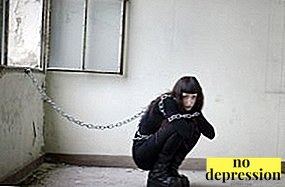The state of emotional comfort of any person depends on how satisfied his basic needs.
If everything is ok, he is able to manage his thoughts, actions, and also to make responsible decisions.
Otherwise, emotional deprivation occurs - dissatisfactionthat occurs as a reaction of the psyche to certain problems.
What is it in psychology?

Emotional deprivation - a special reaction of the psyche to an unmet need.
It can manifest itself in the form of mental disorders in which a person loses a sense of confidence and security, instead of which there is a feeling of anxiety, emptiness and fear of any changes.
Such a violation of the emotional state leads to the fact that man is in constant tension by virtue of which, it loses the ability to think sensibly, to find a way out of various situations, to see and use new perspectives.
Instead, it becomes closed and anxious hostage to stressand sometimes prolonged depression.
He tries to “shut himself up” from the outside world as much as possible, narrows his social circle and in every way seeks to isolate himself from people to whom he is extremely cautious and incredulous.
Causes in adults and children
There are two main groups of causes that lead to emotional deprivation:
- Dramatic events. Disasters, disasters, betrayal or loss of a loved one, serious illness, difficult life situations associated with the loss of work or loss of livelihood - all this leads to the fact that a person does not want to allow any destructive information into his mind, simply denying the fact of its existence .
 At the same time, a sense of mistrust towards others is born in it, faith in one’s own strength and the ability to look at the situation soberly is lost. The person is obsessed with the problem and does not want to look for ways to solve it, experiencing again and again tragic events. Being in a state of constant stress, he ceases to see the line between the real state of things and fiction, the details of which he can dummify and wind himself to such an extent that he cannot not only solve the problem, but also approach it.
At the same time, a sense of mistrust towards others is born in it, faith in one’s own strength and the ability to look at the situation soberly is lost. The person is obsessed with the problem and does not want to look for ways to solve it, experiencing again and again tragic events. Being in a state of constant stress, he ceases to see the line between the real state of things and fiction, the details of which he can dummify and wind himself to such an extent that he cannot not only solve the problem, but also approach it. - Unmet needs. The need for love, respect, self-realization and social recognition must be realized in every person, along with physiological needs. If at least one of them is not satisfied, the person begins to experience emotional suffering. There is irritability, depression, self-esteem decreases.
In this state, a person stays until the shortage of a particular need is satisfied.
In childhood, the main cause of deprivation is lack of tactile contact with parents (especially mom), as well as ignoring the child's emotions, when only the main (in adult's view) needs are in the foreground: health, sleep, food, clothes.

Lack of communication and pleasant emotions leads to developmental delay child in many areas (intellectual, speech).
This is especially true of children growing up without parental care. in orphanages and boarding schools.
As adults, they experience distrust of people in particular, and to the world as a whole, it can be quite difficult for them to open up to a partner and create a full-fledged family.
At an older age, not less important is the need to communicate with peers, without which the child will not be easy to adapt to life in society.
Symptoms
The main symptoms of emotional deprivation are:
- Feeling of dissatisfaction. Whatever a person does, he is haunted only by a feeling of emptiness and powerlessness. Moral satisfaction is completely absent, be it work, social activity or hobby. This state of affairs impedes the pursuit of new goals, achievements and victories.
- Reduced interest in life. Habitual values are beginning to be questioned, priorities are revised, new conclusions are drawn, which are almost always wrong and contradict the person’s lifestyle. As a result, the idea arises that everything good in life “has already happened”, and only a series of difficulties and problems awaits ahead.
- Feeling of emptiness. The constant feeling of losing something very important does not allow a person to relax and find a way out of this situation.
It seems that inside there is a void, which is impossible to fill.
- Closure. A person begins to shun other people, protecting himself from any communication. It begins to seem to him that absolutely no one understands him, because of what he is immersed in his thoughts. He practically does not leave the house and even stops noticing that life, which has its own joys, is still full of life.
- Anger and aggression. Such states can manifest themselves not only in relation to outsiders, but also to themselves: a person begins to consciously hurt himself, as if in punishment for something.
- Increased anxiety. An inexplicable feeling of anxiety and fear of any changes, new events - all that is connected with uncertainty. A person simply begins to fear the future, becomes passive and avoids any active actions, sadly "going with the flow." Such a condition can affect the quality of sleep, manifesting insomnia caused by anxiety at night.
- Frequent mood swings. The instability of the emotional state sometimes does not depend on external causes.
Sudden laughter gives way to tears, and sadness - aggression.


Effects
A prolonged state of emotional deprivation can lead to some negative consequences. In children, it is:
- behavior change (most often hyperactivity) in order to attract the attention of an adult;
- the emergence of fantasies, fictional friends, etc .;
- falling into a state of constant despondency;
- compensating for the lack of parental attention by communication with peers (and not always, well-off).

In adults, the effects of deprivation appear somewhat different and look like:
- the desire to compensate for the lack of positive emotions by watching movies, music, books, games (typical of the initial stage of deprivation) and various extreme hobbies;
- the occurrence of obsessive states, hysteria, psychosis, delusions;
- depletion of the body caused by prolonged lack of appetite and sleep;
- prolonged depression, apathy;
- auto-aggression (intentional infliction of serious harm to one’s health, or the occurrence of psychosomatic diseases);
- promiscuity;
- use of psychotropic substances or drugs;
- the appearance of obsessive thoughts about suicide, up to the commission of his attempts.
It is noteworthy that all manifestations and consequences of deprivation tend to disappear temporarily due to the emergence of serious threats to life (wars, serious diseases, etc.) that trigger the mechanisms of survival and push all symptoms into a different plane.
Coping methods

You can overcome the deprivation solely by achieving harmony with oneself and establish emotional balance.
Often, a person is simply unable to do this on his own, because he does not realize that the problem exists in principle.
That is why it is so important to close people were on timeable to help and convince to seek help from a psychologist or psychotherapist.
As a rule, the way to overcome the problem includes several stages:
- Identification and identification of the underlying cause leading to emotional deprivation.
- Consideration of the possibility of eliminating the root cause, if it is possible (for example, the satisfaction of certain needs).
- “Disconnection” of deprivation mechanisms (in the event that it is not possible to eliminate the main cause).
At least temporarily out of the state of deprivation man can help:
- High physical activity. Dancing, aerobics, gymnastics, fitness, etc., trigger internal mechanisms in the body for survival, temporarily switching the human mind from disturbing thoughts and obsessive ideas.
- Creation. Art therapy is especially useful because it allows you to “throw out” emotions, feelings, feelings hidden deep inside, while being freed from anxiety and fears.

But all this must be done in conjunction with regular expert advice - only in this case it will be possible to hope for a positive result of therapy.
As for emotional deprivation in children growing up in a family, but experiencing a similar condition, play an important role in the process of overcoming it. parents.
First of all, they should receive a consultation (and sometimes complete a full course of therapy) of a psychologist to help their child.
They must understand that any emotions of a child (even the smallest) are significant.
Often neglect the so-called emotional upbringing, inclined are those parents who did not get it in their childhood. It is simply vital for such people to master themselves and show the child how important it is:
- recognize your own emotions and voice them;
- allow the possibility of making a mistake for which they do not punish, but help to correct it;
- learn to show compassion for others and for yourself;
- not to be afraid of expressing your emotions and desires;
- be able to unconditionally accept and love yourself.

Permanent parental example unconditional love and close emotional contact will help the child overcome the state of deprivation and save themselves from possible problems in adulthood.
Emotional deprivation is a rather complicated condition, especially if it lasts a long time.
Therefore incredible it is important to “pull out” a person in timein order to avoid complications of this condition with all the ensuing consequences.
At the same time, it is important to understand that a person cannot independently seek help from a specialist simply because he does not realize the existence of the problem.
Emotional deprivation - how to detect and correct? Find out from the video:

 At the same time, a sense of mistrust towards others is born in it, faith in one’s own strength and the ability to look at the situation soberly is lost. The person is obsessed with the problem and does not want to look for ways to solve it, experiencing again and again tragic events. Being in a state of constant stress, he ceases to see the line between the real state of things and fiction, the details of which he can dummify and wind himself to such an extent that he cannot not only solve the problem, but also approach it.
At the same time, a sense of mistrust towards others is born in it, faith in one’s own strength and the ability to look at the situation soberly is lost. The person is obsessed with the problem and does not want to look for ways to solve it, experiencing again and again tragic events. Being in a state of constant stress, he ceases to see the line between the real state of things and fiction, the details of which he can dummify and wind himself to such an extent that he cannot not only solve the problem, but also approach it.

